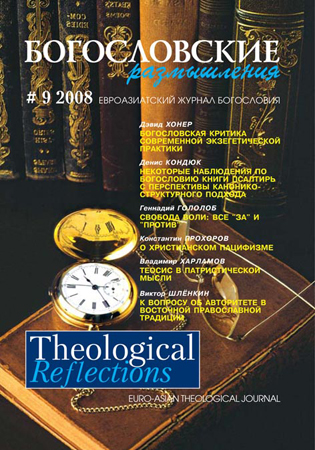A Theological Critique of Modern Exegetical Practice
Keywords:
Scriptural interpretation, modern exegesis' interest, theological interpretationAbstract
The purpose of this article is to call for a more theologically rich understanding of the task of Scriptural interpretation. It begins by outlining a Trinitarian description of revelation and discussing what this means for our understanding of Scripture. Identifying Scripture as God’s primary instrumentality of revelation, the article advances the “theological virtues”—faith, hope, and love—as essential for a reader to interpret Scripture well.
The article then explores modern exegesis’ interest in the literal meaning of the text and the current critique of this approach. It explores what authorial intention is through interacting with E.D. Hirsch’s distinction between “meaning” and “significance” and Gadamer’s understanding of interpretation through the metaphor of conversation. It argues that an affirmation of divine authorship and an understanding of Christ as God’s fullest self-revelation opens the way for theological interpretations of Scripture which go beyond human authorial intention. It then demonstrates such theological interpretation in the apostolic writings and its justification in the writings of Origen and Aquinas.
References
- Brown R.E. “Hermeneutics.” In The Jerome Biblical Commentary. 2 vols. in one. Ed. R.E. Brown, J.A. Fitzmyer and R.E. Murphy. Englewood Cliffs, NT: Prentice-Hall, 1968, 2:605-23.
- Bruns G.L. “Midrash and Allegory: The Beginnings of Scriptural Interpretation.” The Literary Guide to the Bible. Eds. Robert Alter and Frank Kermode. Cambridge: The Belknap Press, 1987, 625-646.
- de Lubac, Henri. Medieval Exegesis, vols. 1-2, trans. E.M. Macierowski. Grand Rapids: Eerdmans, 1998, 2000.
- Dulles A. Models of Revelation. Maryknoll, New York: Orbis Books, 1992.
- Farkasfalvy D. “A Heritage in Search of Heirs: The Future of Ancient Christian Exegesis,” Communio. 25 (Fall 1998), 505-19.
- Farley E. Theologia: The Fragmentation and Unity of Theological Education. Philadelphia: Fortress Press, 1983.
- Florovsky G. “Revelation, Theology, and Philosophy.” Collected Works of George Florovsky, Vol. III: Creation and Redemption. Belmont, Mass.: Nordland Publishing Company, 1976, 21-40.
- Fowl S. E. Engaging Scripture: A Model for Theological Interpretation. Malden, MA: Blackwell Publishers, 1998.
- Fowl S. E., Jones L.G. Reading in Communion: Scripture and Ethics in Christian Life, Grand Rapids: Eerdmans, 1991.
- Gadamer H.G. Truth and Method:Truth and Method, 2nd rev. ed. Trans. J. Weinsheimer and D.G. Marshall. New York: Continuum, 1989.
- Green J. B., Turner M. (Eds.). Between Two Horizos: Spanning New Testament Studies and Systematic Theology. Grand Rapids: Eerdmans, 2000.
- Guyon J. Experiencing the Depths of Jesus Christ. Gardiner, Maine: Christian Books, 1975.
- Hirsch, Jr., E.D. The Aims of Interpretation. Chicago: The University of Chicago Press, 1976.
- Hirsch, Jr., E.D. Validity in Interpretation. New Haven: Yale University Press, 1967.
- Lindbeck G. A. The Nature of Doctrine: Religion and Theology in a Postliberal Age. Philadelphia: The Westminster Press, 1984.
- Longenecker R. Biblical Exegesis in the Apostolic Period. Grand Rapids: Eerdmans, 1975.
- Meyendorff J. Byzantine Theology: Historical Trends and Doctrinal Themes. New York: Fordham University Press, 1979.
- Moo. D.J. “The Problem of Sensus Plenior.” Hermeneutics, Authority and Canon. Ed. by D.A. Carson and J.D. Woodbridge. Leicester: InterVarsity, 1986: 179-211.
- Schleiermacher F. D. E. “Hermeneutics and Criticism.” The Hermeneutics Reader. Ed. K. Mueller-Vollmer. New York: Continuum, 1985, 72-97.
- Steinmetz D. “The Superiority of the Pre-Critical Exegesis,” Theology Today 37 (1980), 27-38.
- Vanhoozer K.J. “First Theology: Meditations in a Postmodern Toolshed,” First Theology. Downers Grove: InterVarsity Press, 2002, 15-41.
- Vanhoozer K.J. “God’s Mighty Speech Acts: The Doctrine of Scripture Today,” First Theology. Downers Grove: InterVarsity Press, 2002, 127-58.
- Vanhoozer K.J. Is There Meaning in This Text? The Bible, the Reader and the Morality of Literary Knowledge. Grand Rapids: Zondervan, 1998.
- Watson F. Text, Church, and World. Grand Rapids: Eerdmans, 1994.
- Webster J. “Hermeneutics in Modern Theology: Some Doctrinal Reflections,” Scottish Journal of Theology 51 (1998), 307-41.
- Webster J. Holy Scripture: A Dogmatic Sketch. Cambridge: Cambridge University Press, 2003.
- Wilken R. L. “In Dominico Eloquio: Learning the Lord’s Style of Language,” Communio 24 (Winter 1997), 846-66.
Downloads
How to Cite
Issue
Section
License
Copyright (c) 2020 David НOEHNER

This work is licensed under a Creative Commons Attribution-NonCommercial 4.0 International License.
All articles published in the Journal are distributed under a Creative Commons Attribution-NonCommercial 4.0 International License
By submitting an article for publication in Theological Reflections: Eastern European Journal of Theology the author grants the editors the right to publish the article and distribute it in electronic and print form.
The author reserves all copyrights and the right to use the materials of the article in whole or in part for educational purposes, to write his own dissertations, to prepare abstracts, conference reports, oral presentations, etc., as well as post electronic copies of articles (including the final electronic version downloaded from the journal’s official website) on non-commercial web-resources without the consent of the editorial board and founders.



